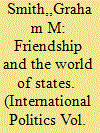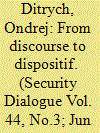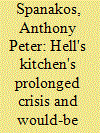| Srl | Item |
| 1 |
ID:
101834


|
|
|
|
|
| Publication |
2011.
|
| Summary/Abstract |
What contribution can a theorization of friendship offer to the understanding of the world of states? It is argued here that the contemporary view of friendship eclipses a longer and broader appreciation. As such, the view of friendship that identifies it as affective, private and particular (here termed the contemporary-affective view) is one instance of a much wider cluster of ideas sharing overlapping characteristics. So conceptualized, 'friendship' is the concern with what binds person-to-person. It is a concern with the nature and fabric of the political. Seen from this vantage point, friendship highlights what an analysis through the state tends to overshadow: the enduring affinities, identifications and bonds that permeate the dynamics of the world of states. Thus, friendship need not remain the preserve of the premodern (Aristotle), nor be usurped as an adjunct to sovereignty and power (Schmitt), but investigated as an ongoing site of analysis for phenomena within, between and beyond states.
|
|
|
|
|
|
|
|
|
|
|
|
|
|
|
|
| 2 |
ID:
121823


|
|
|
|
|
| Publication |
2013.
|
| Summary/Abstract |
This article is a historical study of how states have articulated statements about terrorism since the 1930s; under what conditions these statements have been articulated; and what effects the discourses made up of these statements have had on global politics. This includes the constitutive role of the present discourse on what is posited as a terrorism dispositif. The inquiry is inspired by Foucault's historical method, and comprises the descriptive archaeological analytic focused on the order of the discourse (including basic discourses in which the terrorist subject is constituted) and the genealogical power analysis of external conditions of emergence and variation of discursive series, whose treatment benefits also from Carl Schmitt's concept of the nomos.
|
|
|
|
|
|
|
|
|
|
|
|
|
|
|
|
| 3 |
ID:
131539


|
|
|
|
|
| Publication |
2014.
|
| Summary/Abstract |
Comic book heroes often have their origins in noir depictions of failed or failing states. The danger involved and the seeming anarchy that necessitates superheroes recall Hobbes's description of a state of nature and Leviathan as resolution. But comic book heroes generally inhabit states that are better identified by the Hobbes-inspired Carl Schmitt. Indeed, this articles argues that while the Hell's Kitchen of Daredevil comics has some characteristics of a state of nature, it is better characterized by the protracted crisis of state that Schmitt sees in liberal democracies. Hobbes and Schmitt elucidate the crisis that generates the need for a superhero but fail to explain why the superhero does not simply take over the city. This is better explained by American concepts of heroism which emphasize redemption and walking away from power (Lawrence and Jewett 2002).
|
|
|
|
|
|
|
|
|
|
|
|
|
|
|
|